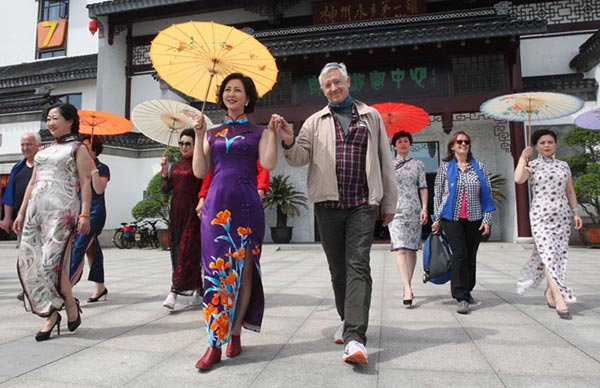Expat talents urged to contribute to China
Premier Wen Jiabao on Thursday invited more foreign experts to work in China, pledging better conditions for them.
With the Chinese Lunar New Year around the corner, Wen extended New Year's greetings to about 20 veteran foreign experts working in China's education, scientific research, culture and health sectors. They were invited to the Great Hall of the People for a seminar with the premier on Thursday.
Wen said foreign experts have contributed to China's revolution and modernization drive, which the Chinese people will always remember.
He also said China will unswervingly stick to the reform and opening-up policy.
"A nation can be prosperous only when it is open and inclusive," the premier said, adding that the number and quality of foreign experts reflect an open and civilized country.
"We will, as we are doing, welcome a large number of foreign experts, especially high-end talent in all fields to work in China and we will provide better policies and working environments for them," he said.
More than 550,000 foreign experts were working in China in 2012, according to Zhang Jianguo, director of the State Administration of Foreign Experts Affairs.
China has introduced various programs to attract foreign professionals.
The Recruitment Program of Foreign Experts, which started in 2011, aims to attract up to 1,000 foreign professionals over 10 years to help spur innovation, promote scientific research and corporate management.
The project has brought in 94 recruits.
Professionals recruited by the program will be entitled to subsidies, research allowances, favorable salaries, residency permits, medical care and insurance policies.
Guillermo Pulido of Mexico is one of the recruits.
Pulido now works as the director of the Center of Mexican Studies at Beijing Foreign Studies University.
His job is to help more people in China understand Mexican culture, through its language, literature and history.
"I chose (to work in) China without a second thought," said Pulido, adding that his interest in China began when he was young. "I read books about ancient China at school in Mexico, and I became helplessly curious, especially about the ancient philosophies of Confucius and Lao Tzu," he said.
Wang Huiyao, director of the Center for China and Globalization in Beijing, said in general the number of foreign experts working in China is comparatively small.
"We should further make our global talent introduction polices in accordance with international practices, such as using talent immigration measures and introducing more convenient visa and residence policies," he said.
"The United States attracts around 62 percent of the world's top scientists to live there and produces around 70 percent of the Nobel Price winners in natural science work in the country. That is closely related to its immigration and visa policy," Wang said.
Besides scientists, China should introduce more global talent in fields such as the economy, corporate management and higher education, he suggests.
Luo Wangshu and Xinhua contributed to this story.
chenxin1@chinadaily.com.cn

















